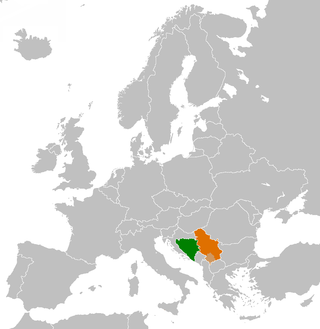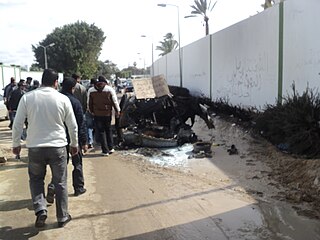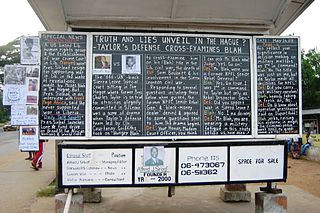
UN Mission of Observers in Prevlaka (UNMOP) was established on 15 January 1996 in Security Council Resolution 1038 as a peacekeeping mission to monitor the demilitarization of the disputed Prevlaka peninsula by carrying out daily foot and vehicle patrols on both sides of the border between Croatia and Yugoslavia.

A United Nations Security Council resolution (UNSCR) is a United Nations resolution adopted by the Security Council (UNSC), the United Nations (UN) 15-member body charged with "primary responsibility for the maintenance of international peace and security".

The United Nations Mission in Liberia (UNMIL) was a United Nations peacekeeping operation established in September 2003 to monitor a ceasefire agreement in Liberia following the resignation of President Charles Taylor and the conclusion of the Second Liberian Civil War (1999–2003). At its peak it consisted of up to 15,000 UN military personnel and 1,115 police officers, along with civilian political advisors and aid workers.

The African Union-United Nations Hybrid Operation in Darfur was a joint African Union (AU) and United Nations (UN) peacekeeping mission formally approved by United Nations Security Council Resolution 1769 on 31 July 2007, to bring stability to the war-torn Darfur region of Sudan while peace talks on a final settlement continue.

The United Nations Mission in the Central African Republic and Chad (MINURCAT) was a United Nations peacekeeping mission established by the United Nations Security Council on September 25, 2007 to provide a multidimensional presence of up to 350 police and military personnel to eastern Chad and north-eastern Central African Republic

United Nations Security Council resolution 857, adopted unanimously on 20 August 1993, after recalling 808 (1993) and 827 (1993) and considering the nominations for Judges of the International Criminal Tribunal for the former Yugoslavia received by the Secretary-General Boutros Boutros-Ghali before 16 August 1993, the council established a list of candidates in accordance with Article 13 of the Statute of the International Tribunal.

United Nations Security Council resolution 929, adopted on 22 June 1994, after recalling all resolutions on Rwanda, including 912 (1994), 918 (1994) and 925 (1994), the council authorised, under Chapter VII of the United Nations Charter, the temporary establishment of a multinational operation in the country to assist in humanitarian efforts and protect refugees and displaced people, until the full deployment of the expanded United Nations Assistance Mission for Rwanda (UNAMIR).

United Nations Security Council resolution 943, adopted on 23 September 1994, after reaffirming all resolutions on the situation in Bosnia and Herzegovina, the Council suspended some restrictions against the Federal Republic of Yugoslavia and discussed the closure of the border between both countries.

United Nations Security Council resolution 1334, adopted unanimously on 22 December 2000, after recalling resolutions 1270 (1999), 1289 (1999), 1313 (2000), 1317 (2000) and 1321 (2000) on the situation in Sierra Leone, the Council extended the mandate of the United Nations Mission in Sierra Leone (UNAMSIL) until 31 March 2001. It was the final resolution adopted in 2000.

United Nations Security Council Resolution 1613, adopted unanimously on 26 July 2005, after recalling resolutions 827 (1993), 1166 (1998), 1329 (2000), 1411 (2002), 1431 (2002), 1481 (2003), 1503 (2003), 1534 (2004) and 1597 (2005), the Council forwarded a list of nominees for temporary judges at the International Criminal Tribunal for the former Yugoslavia (ICTY) to the General Assembly for consideration.

United Nations Security Council Resolution 1970 was a measure adopted unanimously by the UN Security Council on 26 February 2011. It condemned the use of lethal force by the government of Muammar Gaddafi against protesters participating in the Libyan Civil War, and imposed a series of international sanctions in response.

Resolution 1973 was adopted by the United Nations Security Council on 17 March 2011 in response to the First Libyan Civil War. The resolution formed the legal basis for military intervention in the Libyan Civil War, demanding "an immediate ceasefire" and authorizing the international community to establish a no-fly zone and to use all means necessary short of foreign occupation to protect civilians.

United Nations Security Council resolution 1638, adopted unanimously on 11 November 2005, after recalling all previous resolutions on the situation in Liberia, Sierra Leone and West Africa, the Council included the apprehension, detention and transfer to the Special Court for Sierra Leone of former Liberian President Charles Taylor in the mandate of the United Nations Mission in Liberia (UNMIL).

United Nations Security Council Resolution 1689, adopted unanimously on June 20, 2006, after recalling all previous resolutions on the situation in Liberia and West Africa, the Council decided to continue sanctions against the import of diamonds from the country for six months, though similar restrictions relating to timber imports were lifted.

United Nations Security Council Resolution 2009 was unanimously adopted on 16 September 2011.
United Nations Security Council Resolution 1776 was adopted on 19 September 2007.
United Nations Security Council Resolution 1843 was unanimously adopted on 20 November 2008.

The eleventh emergency special session of the United Nations General Assembly opened on 28 February 2022 at the United Nations headquarters. It addresses the Russian invasion of Ukraine. Maldivian politician Abdulla Shahid served as President of the body during this time.

United Nations Security Council Resolution 2623 called for the eleventh emergency special session of the United Nations General Assembly on the subject of the 2022 Russian invasion of Ukraine. Albania and the United States introduced the resolution before the United Nations Security Council, which adopted it on 27 February 2022. Russia voted against while China, India and the United Arab Emirates abstained. As this was a procedural resolution, no permanent member could exercise their veto power.

United Nations General Assembly Resolution ES‑11/2 is the second resolution of the eleventh emergency special session of the United Nations General Assembly, adopted on 24 March 2022, following Resolution ES-11/1 which was adopted on 2 March 2022. Resolution ES‑11/2 reaffirmed the UN's former commitments and obligations under its Charter, and reiterated its demand that Russia withdraw from Ukraine's recognized sovereign territory; it also deplored, expressed grave concern over and condemned attacks on civilian populations and infrastructure. Fourteen principles were agreed.














